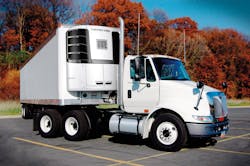Hardware Report: Refrigeration
Regulatory measures are impacting a refrigerated carrier’s choice in transport refrigeration systems. As the Food Safety Modernization Act (FSMA) establishes greater accountability throughout the supply chain, for example, it is widely expected that shippers will require more refrigeration unit data. And regulations affecting refrigerants with high global warming potential may ultimately impact refrigerated transport in North America.
Dave Kiefer, director of sales, marketing and product management, Truck, Trailer, Rail Div. at Carrier Transicold, notes that to address information needs, data recording features are built into the company’s APX control system and independent temperature-monitoring devices, such as its new DataLink 2 system.
Beyond regulations, Kiefer says, fleets are seeking high-capacity transport refrigeration units that provide fuel and weight savings over previous models. Available from Carrier Transicold is the diesel-powered X4 Series platform in 7300 and 7500 single-temperature models.
Carrier Transicold also offers the hybrid diesel-electric Vector 8500 single-temperature and Vector 8600MT multi-temperature units with all-electric technology, which eliminates the mechanical transmissions found in conventional belt-driven refrigeration systems and transforms engine power into electricity through a generator. The technology also allows refrigeration units to run independently when parked and plugged into an electric power supply.
“A California Air Resources Board (CARB) initiative proposes banning use of diesel engines when stationary as early as 2020 and requiring a technology such as refrigeration units that can be plugged in,” Kiefer says.
Fleets should consider CARB compliance when choosing refrigeration units, says Tom Kampf, product manager, Trailer Refrigeration Units at Thermo King. “If they travel into California regularly and will keep the unit for more than seven years, they should spec products that can be used in the state beyond the seven-year life of the unit without adding a Level 3 emissions device,” he relates.
Kampf also says that as fleets adopt telematics systems for refrigeration units to comply with FSMA recordkeeping requirements, they should consider power supply needs. He points out that solar panels can offset power use and help extend battery life.
Available from Thermo King today are ThermoLite solar panels in three different wattage options. The company’s CARB compliant refrigeration unit offerings include Precedent single-temperature S-600 or S-700 and multi-temperature S-610M, C-600M or S-600DE models.
Refrigerated fleets can also opt for the low cost alternative offered by cold plate refrigeration technology, says Eduardo Navarro, director of business development for Great Dane Truck Bodies. “The benefits of these systems include fuel and maintenance savings, but they do require a dedicated electrical terminal to power the compressor and recharge the plates.”
Great Dane offers the all-electric AE and EMX Series cold plate refrigeration systems from Johnson Refrigerated Truck Bodies. These include programmable control units and in some applications an auto defrost system. The AE system plates are recharged by shore power when the truck is parked, and the EMX system uses a chassis-driven PTO to power the electric compressor while driving.
The Morgan Cold Plate system is electrically driven and designed to maintain a specific product temperature range from -20 deg. F to 35 deg. F for a wide variety of single- and multi-temperature applications. Failure to defrost can reduce cooling capacity by over 25%, notes Paul Jarossy, director of business development, so a defrost option that includes blower, water and hot gas solutions helps prevent frost buildup on the plates.
Hercules Manufacturing offers cold plate refrigeration systems with ceiling or front wall-mounted plates and blower systems. “Fleets are seeking refrigeration solutions that deliver reliable temperature control,” Jeffrey A. Caddick, CEO/owner, says. “Refrigeration systems [require] minimum maintenance, less fuel consumption, and a long life cycle.”
